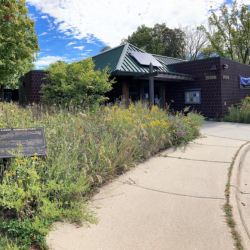NCYGS Local Host and Headquarters
 Chicago Botanic Garden
Chicago Botanic Garden
Climb a waterfall garden, discover hidden rooms inside an English Walled Garden, cross bridges spanning sparkling lakes, a Japanese Garden and discover a garden with trains chugging across bridges and trestles. The Chicago Botanic Garden opened more than 40 years ago as a beautiful place to visit, and it has matured into one of the world’s great living museums and conservation science centers. There’s 27 gardens and four natural areas, uniquely situated on 385 acres on and around nine islands, with six miles of lake shoreline. The Garden also has renowned youth garden education programs. Chicago Botanic Garden will be the headquarters for the symposium’s learning sessions.
Pre-Symposium Field Sites
(Separate registration required)
Ball Horticultural Company
Ball Horticultural Company is a leader in all facets of horticulture, with a global family of breeders, research and development teams, suppliers, and distribution on six continents in 20 countries. And its global headquarters is in West Chicago, Illinois! Since 1933, the Gardens at Ball have been the evaluation and testing grounds for the horticulture industry. We will take a tour of the 12-acre display gardens showcasing over 1,800 varieties of the most successful and innovative plants in the nursery industry, including annuals, perennials, cut flowers, mixed containers, vegetables, and more. Time permitting, we may also get an inside look at the Ball Helix Innovation Center, where scientists develop the latest breeding, genetic, plant pathology, and technical solutions.
The Morton Arboretum
The Morton Arboretum, located in Lisle, Illinois, is an internationally recognized tree-focused botanical garden and research center. Its 1,700 acres of beautiful tree-filled landscapes are a place of enjoyment, a vibrant hub for nature education, and a world-renowned center for scientific research that studies trees and how to sustain them. We will take a tram tour of the sprawling campus and collections, followed by dedicated time exploring the four-acre Children’s Garden with an arboretum staff member specializing in early childhood programs. Built in 2005, the Children’s Garden introduces plant physiology and ecology through self-guided and mediated hands-on experiences. From backyard-themed landscapes to wild, natural landscapes, young visitors learn through play, senses, observation, and experimentation.
Symposium Field Trips
(included in full symposium registration and with Wednesday one-day registration)
Field Trip #1: Nature Centers
 Emily Oaks Nature Center
Emily Oaks Nature Center
Skokie’s thirteen-acre nature center is a woodland oasis full of native wildflowers and grasses, ancient oak trees, a two-acre pond, wood chip and asphalt trails, and an adjacent playground. Residing and visiting urban wildlife includes herons, coyotes, flying squirrels, painted turtles, and Cooper’s hawks. We will explore the property with the Emily Oaks staff as they share about their Earth Education approach for their wide-ranging programs, including the early childhood nature experience, summer camps, school and scout programs, and community events.
Photo credit: Emily Oaks Nature Center
 Ladd Arboretum
Ladd Arboretum
Ladd Arboretum is a 23-acre corridor showcasing collections by plant family, including birch, legume, maple, oak, and pine. Gardens include the Meadow Garden, Prairie Restoration Area, Cherry Tree Walk, Nut Tree, Rotary Club of Evanston’s International Friendship Garden (with All-America Rose Selections), Women’s Terrace, gazebo, and bird sanctuary. City of Evanston parks staff will show us the property’s highlights for youth engagement, including a demonstration garden, a food forest, and a native plant path.
Photo credit: City of Evanston

Field Trip #2: Lakeshore Parks
The City of Evanston is a leader in both shoreline restoration and green space master planning. Parks department staff will first take us to Lighthouse Beach, where we will learn about the habitat gardening approach, dune restoration efforts, and Jens Jensen garden revitalization. We will then proceed to Clark Street Beach, where we will see a bird sanctuary with native plants, followed by Lunt Park, where we will learn about tree planting efforts to increase the canopy layers throughout the city. We will also learn about and witness youth recreation in these green spaces.
Photo credit: City of Evanston

Field Trip #3: School Gardens
Visit Evanston Township High School, which sits on 65 acres and serves nearly 4,000 students, to learn about their horticulture program and see their gardens. Staff will lead tours of the school’s two garden locations and share about the four horticulture classes, in which students tend to 50 raised beds, a fruit tree orchard, a greenhouse, and a vegetable preparation station. The produce is served in the school cafeteria and sold through a community supported agriculture model. We will also learn how the school’s gardens serve as a training ground for future horticulturists through a summer youth employment initiative.
This field study will also visit the Talking Farm, an urban agriculture non-profit that connects communities to the benefits of a healthy local food system and collaborates with the neighboring Tot Learning Center. The Talking Farm features a demonstration garden, raised beds, hoop houses, and crop fields on 2.5 acres, producing over 60,000 pounds of food annually for local communities. In addition to a tour, attendees will participate in a hands-on workshop — be prepared to get your hands in the dirt!
Photo credit: Google
